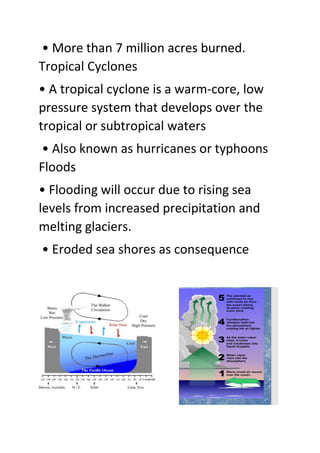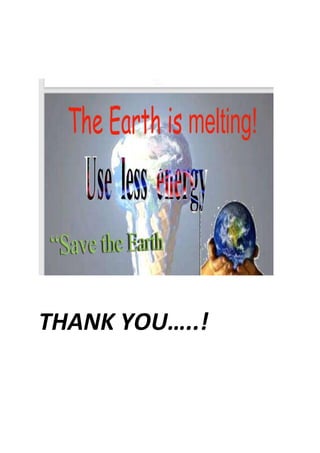Evs project report on effect of global warming
- 1. EVS PROJECT REPORT ON : - Effect of Global Warming Name : - Rajas Jayant Patil ROLL NO :- 43 SYBBA- CA Teacher Name : - MRS. SHARDA PATIL
- 2. 1.Introduction What is Global Warming? 'Global warming' is an expression which refers to the effect of human activities that produces the unnatural change on the climate. It is an increase in earth‘s temperature due to burning of fossil fuels (coal, oil and gas) and large-scale deforestation, which results in emission of large amounts of 'greenhouse gases' to the atmosphere. Global warming refers to the rising average temperature of Earth's atmosphere and oceans, which started to increase in the late 19th century and is projected to keep going up. Since the early 20th century, Earth's average surface temperature has increased by about 0.8 C (1.4 F), with about two thirds of the increase occurring since 1980. Warming of the climate system is unequivocal, and scientists are more than 90% certain that most of it is caused by increasing concentrations of greenhouse gases produced by human activities such as deforestation and burning fossil fuels. These findings are recognized by the national science academies of all the major industrialized nations.
- 3. An increase in global temperature will cause sea levels to rise and will change the amount and pattern of precipitation, and a probable expansion of subtropical deserts. Warming is expected to be strongest in the Arctic and would be associated with continuing retreat of glaciers, permafrost and sea ice. Other likely effects of the warming include more frequent occurrence of extreme-weather events including heat waves, droughts and heavy rainfall, species extinctions due to shifting temperature regimes, and changesin crop yields…
- 4. Global warming is the warming of the earth through carbon dioxide (CO2) being pumped into the atmosphere from tailpipes and smokestacks. Then the gases trap heat like the glass in a greenhouse. This is where the term the “greenhouse effect” came from. Or we can say that Global Warming is the theory that we as humans are increasing greenhouse gases (the thick layer of gases that catches the sun’s rays and heats the earth) through industrialization causing more gases and increasing the amount of sunlight that gets caught and heats the Earth. Carbon dioxide is the most common gas that causes global warming. It should NOT be confused with climate change ! ! GLOBAL WARMING is the increase of the Earth’s average surface temperature due to a build-up of greenhouse gases in the atmosphere. CLIMATE CHANGE is a broader term that refers to long-term changes in climate, including average temperature and precipitation.
- 5. 2.Review of literature According to Scientists and Government organisations, Concentration of Greenhouse Gases in the atmosphere due to greenhouse effect is the major causes of Global Warming. These gases especially CO2 have heat trapping capability. So they trap heat and cause the greenhouse effect, rising global temperatures. Scientists say that the barrier insulating the continental ice caps is melting. The scientists viewpoint is that global warming and pollution from CO2 emissions are adding to greenhouse gases so significantly that the Earth is warming up and will continue to warm. “The impacts of warming temperatures in Antarctica are likely to occur first in the northern sections of the continent, where summer temperatures approach the melting point of water, 32 degrees F (0 degrees C)
- 6. Some of the main Causes of Global Warming are :- 1. Greenhouse Effects: - Greenhouse effect is the phenomenon in which the heat and light of sun enters to the earth's atmosphere but cannot go out as they are trapped by the greenhouse gases, as a result temperature rises. 2. Greenhouse Gases: - Greenhouse gases mainly comprises of carbon dioxide, methane, and nitrous oxide. These gases are lighter than air, so they rise up to the outer limits of the earth‘s atmosphere and settle up there, making an impenetrable barrier that traps heat from escaping out into the space, and keeping it within our environment, and increases the temperature
- 7. 3. Agriculture : -Agriculture produces large amount of methane and nitrous oxide worldwide, as accounted by IPCC. There are numerous agricultural sources of greenhouse gases. Livestock grazing, waste management and digestive gases contribute half of the emissions produced by agriculture. Nitrogen fertilizers (used for increasing production) release nitrous oxide and comprise 35 per cent of agricultural emissions. 4.
- 8. Effect of global warming Wind Patterns • Walker circulation – huge loop – across the Pacific (east to west); air rises in western Pacific; returns eastward at altitude of a few miles; sinks back to surface and starts loop again. – Peru and Ecuador Computer simulations
- 9. Changes in Precipitation • El Ninos – rainfall in the southern USA and western South America shows an increase in the amount of precipitation falling in the next 100 years •Heat Waves is an extended interval of abnormally hot and usually humid weather • lasts from a few days to over a week. • will become more frequent and more intense. European heat wave of 2003 – in France nearly 20,000 people died • South Australian heat wave of 2006 • July 2006, USA – County of Los Angeles “Since 1980, the earth has experienced 19 of its 20 hottest years on record, with 2005 and 1998 tied for the hottest and 2002 and 2003 coming in second and third.” -Natural.
- 10. • More than 7 million acres burned. Tropical Cyclones • A tropical cyclone is a warm-core, low pressure system that develops over the tropical or subtropical waters • Also known as hurricanes or typhoons Floods • Flooding will occur due to rising sea levels from increased precipitation and melting glaciers. • Eroded sea shores as consequence
- 11. There are Numerous Effects of Global Warming, Some of the effects of global warming observed across the world are :- Rise in Sea Levels : - Due to rise in temperature, the Glaciers present in polar regions are melting rapidly, as a result there is sufficient rise in sea level Droughts and Floods: - Higher temperature leads to faster evaporation of water and leads to drought in one part, and heavy rainfall causes flooding in other part of the world. Experts have estimated that, drought conditions might be increasing by at least 66 percent in upcoming years. Effects on Biodiversity : - Wildlife researchers have noticed some of the strong species migrating to the poles, far north and far south to maintain their needed habitat, for example the red fox normally an inhabitant of North America is now seen living in the Arctic. Also it has been noticed that loss of species and endangerment is rising along with the global temperatures
- 12. Temperatures Weather in recent winters Glacier and Ice Cap Melting • Evidence of global warming is very apparent in the recent melting of ice sheets. • Two places where melting has become extremely visible are Antarctica and Greenland. • One problem with this is that much less heat is absorbed by snow than by water, thus worsening the effect as the ice retreats.
- 13. • One area of particular concern is the Himalayans. 1/3 of the worlds fresh drinking water comes from the run off from this glacier system. • A direct consequence from our polluting actions will be the disappearance of these vital glaciers. • Between the years 1860-1900 average temperatures have increased by 0.75 degrees Celsius. • Over the past 100 years global temperatures have risen by 1.3 degrees. • Recent winter was the warmest winter ever recorded( in the history of the planet Earth). • 10 out of the past 14 years are the warmest on record. Sea level rising • Possibly the biggest threat brought by global warming is rapid sea level changes. • Two years ago the entire Larsen B ice shelf broke away into pieces in less than a month. Scientists thought it would be at least a decade before this shelf melted, even with global warming. • Both Greenland and Western Antarctica are depleting at shocking rates. • Not all of global Warming's effects are unprecedented.
- 14. 3. Methods How To Control Global Warming ? We need to control global warming to reduce the future risk. Global warming is the increase in the average temperature of the Earth’s near-surface air and oceans in recent decades and its projected continuation. Global warming is a very serious issue. The future would be very terrible if we don’t take any action to reduce it right away. Use Public Transport. Use Renewable Energy Like Wind Power. Burn Methane. Use Smart Cooler, Heater & Air Conditioner. Tune up and maintain vehicles properly. Clean the air in your house. Reduce electricity usage to the maximum. Prefer recycling. & Go Green... SAVE PLANET……….!
- 16. We can save electricity and reduce global warming by turning off lights, television, video player, stereo and computer and many other electrical appliances, when not in use. GLOBAL WARMING DUE TO GREEN HOUSE EFFECT Warming of earth by green house effect is occurring since many centuries, it is only due to this effect that good temperature for living is maintained on the earth surface but now due to large scale pollution resulting from rapid industrialization fossil fuel burning ,deforestation etc .this effect has become more severe.
- 17. 4.Result As the ice melts, big chunks of glaciers will break off and become like ice cubes in a big glass of water. The ice chunks, known as icebergs, create mass in the ocean. The icebergs displace the water causing the ocean level to rise. Some of the shoreline in many places like Florida (where the land is at a low altitude) will go under water. This melting could increase the oceans height by up to 2 feet in only one century! This would mean many heavily populated costal cities would flood causing millions maybe billions of dollars and damage and the potential loss of life in these cities..
- 18. 5.Conclusion The term global warming was probably first used in its modern sense on 8 August 1975 in a science paper by Wally Broacher in the journal Science called "Are we on the brink of a pronounced global warming?". Broacher’s choice of words was new and represented a significant recognition that the climate was warming; previously the phrasing used by scientists was "inadvertent climate modification," because while it was recognized humans could change the climate, no one was sure which direction it was going. The National Academy of Sciences first used global warming in a 1979 paper called the Carney Report, it said: "if carbon dioxide continues to increase no reason to doubt that climate changes will result and no reason to believe that these changes will be negligible." The report made a distinction between referring to surface temperature changes as global warming, while referring to other changes caused by increased CO2 as climate change. Global warming became more widely popular after 1988 when NASA climate scientist James Hansen used the term in a testimony to Congress. He said: "global warming has reached a level such that we can ascribe with a high degree of confidence a cause and effect.
- 20. THANK YOU…..!





















